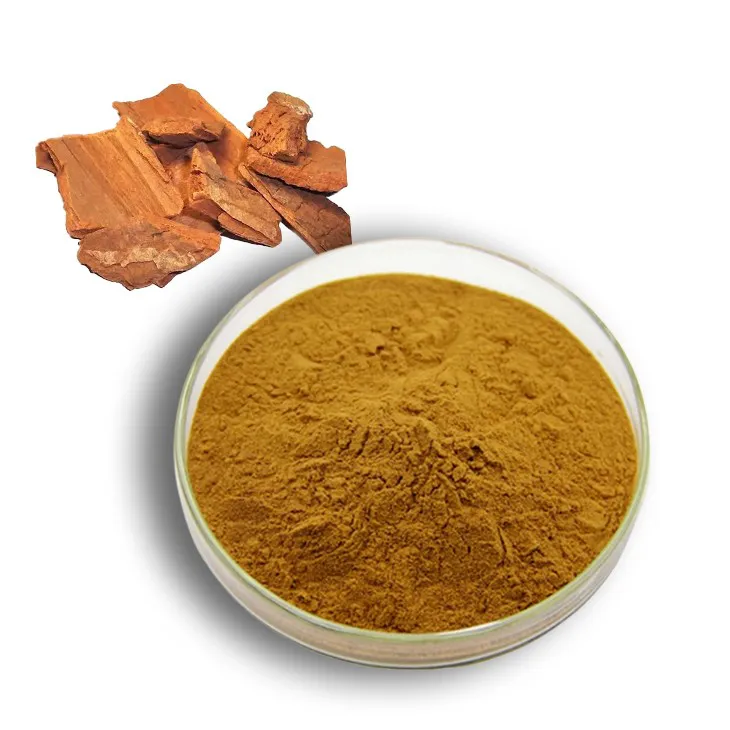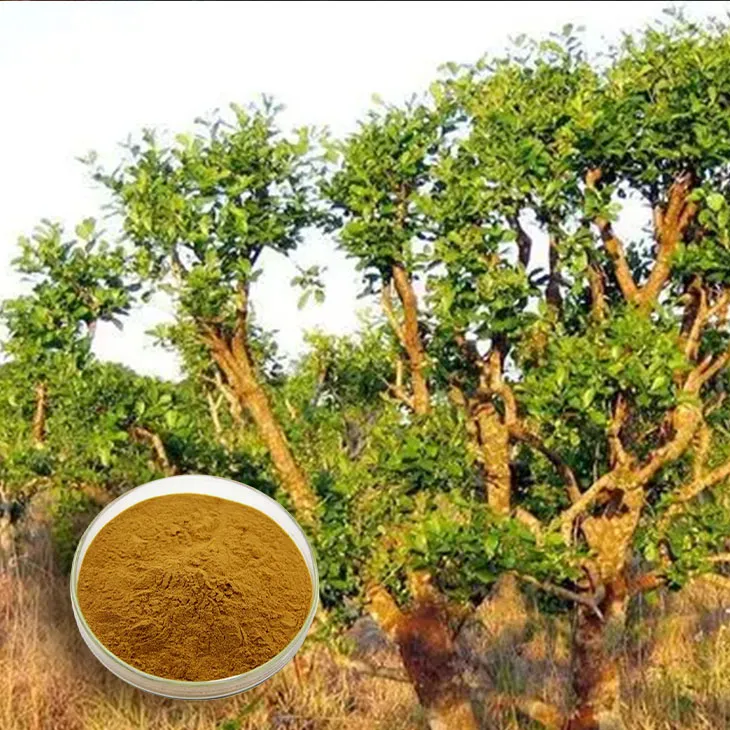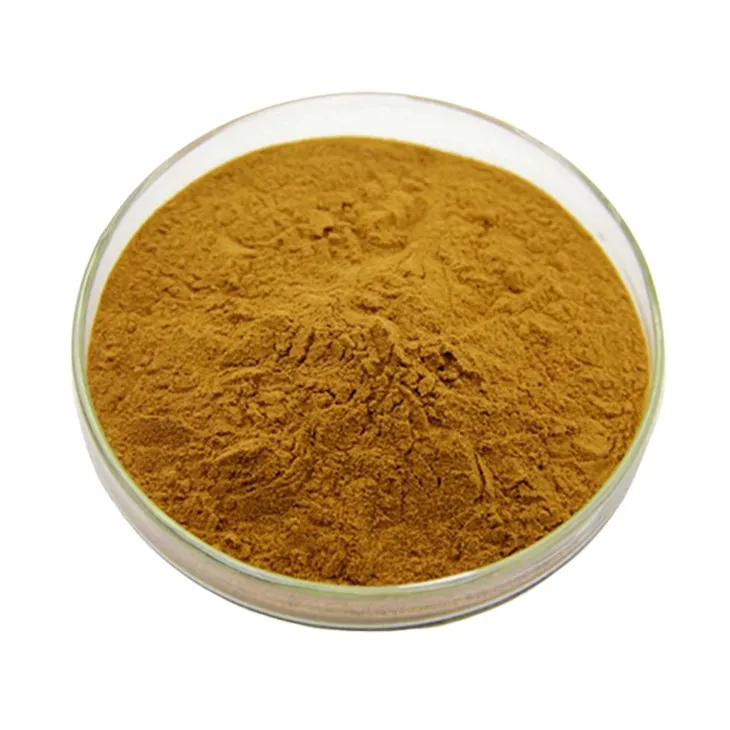- 0086-571-85302990
- sales@greenskybio.com
Use yohimbine bark extract? Make sure you source from sustainable suppliers!
2024-12-21

1. Introduction to Yohimbe Bark Extract
Yohimbe bark extract has been the subject of much interest in various fields. It is derived from the bark of the yohimbe tree, which is native to certain regions in Africa. This extract contains a compound called yohimbine, which has been studied for its potential effects on human health, such as its possible role in weight management and male sexual health. However, the popularity of this extract also poses significant challenges, especially when it comes to sourcing it sustainably.

2. The Importance of Sustainable Sourcing
2.1 Biodiversity Conservation
The yohimbe tree is part of the local ecosystem in Africa. Unsustainable harvesting of its bark can have a detrimental impact on the biodiversity of the area. When too many yohimbe trees are stripped of their bark without proper management, it can disrupt the habitats of numerous other species. For example, many insects, birds, and small mammals rely on the yohimbe tree for shelter, food, or as part of their migratory routes. If the yohimbe tree population declines due to over - harvesting, these associated species may also face population declines or even extinction in the local area.
2.2 Impact on Local Economies
- Sustainable sourcing of yohimbe bark extract can have a positive impact on local economies. When suppliers engage in sustainable practices, they often work closely with local communities.
- This collaboration can lead to the creation of jobs in areas such as tree cultivation, bark harvesting, and extract processing. For instance, local farmers can be trained to grow yohimbe trees in a sustainable manner, which provides them with a source of income.
- Moreover, sustainable sourcing can also ensure the long - term availability of yohimbe bark extract. This is crucial for industries that rely on this extract, as it helps to maintain a stable supply chain. In contrast, if the yohimbe tree is over - exploited, the supply will eventually dwindle, leading to economic losses for both local communities and the global market.
2.3 Maintaining Supply Chain Integrity
- A sustainable supply chain for yohimbe bark extract is essential for ensuring the quality and authenticity of the product. Suppliers who follow sustainable practices are more likely to adhere to strict quality control measures.
- They are also less likely to engage in unethical practices such as adulterating the extract or mislabeling it. This is important for consumers who rely on the integrity of the product for its intended uses. For example, in the health and wellness industry, consumers expect that the yohimbe bark extract they purchase is pure and of high quality.
- Furthermore, a sustainable supply chain can help to prevent illegal activities such as illegal logging and smuggling of yohimbe bark. These illegal activities not only undermine the legitimate market but also pose risks to the environment and local communities.

3. Challenges in Sourcing Sustainably
3.1 Lack of Awareness
One of the main challenges in sourcing yohimbe bark extract sustainably is the lack of awareness among consumers and some producers. Many consumers may not be aware of the environmental and social implications of their purchase decisions. They may simply choose the cheapest option available without considering whether the product is sourced sustainably. Similarly, some producers may not be fully informed about sustainable harvesting practices or may be more focused on maximizing profits in the short - term without considering the long - term consequences.
3.2 Regulatory Hurdles
- The regulation of yohimbe bark extract sourcing varies from country to country. In some regions, there may be a lack of clear regulations regarding sustainable harvesting and trade of this extract.
- This can create a situation where it is difficult to enforce sustainable practices. For example, without proper regulations, some suppliers may be able to engage in over - harvesting or illegal trading without facing significant consequences.
- Moreover, the complexity of international trade regulations can also pose challenges for sustainable sourcing. Different countries may have different requirements for importing and exporting yohimbe bark extract, which can make it difficult for suppliers to navigate the regulatory landscape.
3.3 Competition for Resources
As the demand for yohimbe bark extract grows, there is increased competition for the limited resources of the yohimbe tree. This can lead to a situation where some suppliers may cut corners in order to meet the market demand. For example, they may harvest bark from immature trees or use more intensive harvesting methods that are not sustainable. Additionally, the competition for land to grow yohimbe trees can also be a challenge. In some areas, there may be competing interests for land use, such as for agriculture or other forms of forestry.

4. Strategies for Ensuring Sustainable Sourcing
4.1 Consumer Education
Educating consumers about the importance of sustainable sourcing of yohimbe bark extract is crucial. This can be done through various means, such as:
- Online campaigns: Using social media platforms and websites to raise awareness about sustainable sourcing. For example, creating informative blog posts or videos that explain the environmental and social impacts of yohimbe bark extract sourcing.
- Product labeling: Encouraging producers to use clear and accurate product labels that indicate whether the yohimbe bark extract is sourced sustainably. This can help consumers make more informed purchasing decisions.
- Community outreach: Participating in local community events to educate the public about sustainable sourcing. This can include giving presentations at schools, community centers, or environmental fairs.
4.2 Strengthening Regulations
- Governments should work towards strengthening regulations regarding the sustainable harvesting and trade of yohimbe bark extract. This can include setting clear limits on the amount of bark that can be harvested from each tree and the frequency of harvesting.
- They should also establish strict quality control and certification requirements for yohimbe bark extract products. For example, creating a certification system that verifies whether the product is sourced sustainably.
- International cooperation is also essential in this regard. Different countries should collaborate to develop unified regulations for the international trade of yohimbe bark extract, which can help to prevent illegal activities and ensure sustainable sourcing on a global scale.
4.3 Promoting Sustainable Farming Practices
- Supporting local farmers and producers in adopting sustainable farming practices for yohimbe trees is key. This can involve providing training and technical assistance on topics such as proper tree cultivation, soil conservation, and pest management.
- Financial incentives can also be provided to encourage farmers to engage in sustainable yohimbe tree farming. For example, offering subsidies for the purchase of sustainable farming equipment or providing rewards for farmers who meet certain sustainability criteria.
- Research and development in sustainable yohimbe tree farming should also be promoted. This can lead to the discovery of new and more efficient farming methods that can help to increase the yield of yohimbe bark extract while minimizing the environmental impact.

5. Conclusion
In conclusion, yohimbe bark extract has significant potential in various applications, but its sourcing must be sustainable. The importance of sustainable sourcing cannot be overstated, as it impacts biodiversity, local economies, and supply chain integrity. Despite the challenges in achieving sustainable sourcing, through consumer education, strengthened regulations, and promoting sustainable farming practices, it is possible to ensure that the yohimbe bark extract is sourced in an environmentally and socially responsible manner. This will not only benefit the environment and local communities but also ensure the long - term availability and quality of this valuable natural extract for consumers around the world.
FAQ:
What are the unique properties of yohimbe bark extract?
Yohimbe bark extract contains yohimbine, which is often associated with potential effects on blood flow, energy levels, and in some cases, it has been studied for its impact on male sexual health. However, more research is still needed to fully understand and confirm all of its properties.
Why is sustainable sourcing important for yohimbe bark extract?
Sustainable sourcing of yohimbe bark extract is crucial because it helps protect biodiversity. Over - harvesting from non - sustainable sources can lead to the depletion of yohimbe trees in their native habitats. It also impacts local economies in a positive way when done sustainably, as it can ensure a long - term source of income for local communities. Moreover, it maintains the integrity of the supply chain by providing a reliable and ethical source of the extract.
How can one identify a sustainable supplier of yohimbe bark extract?
To identify a sustainable supplier, look for certifications such as those related to forestry management (e.g., FSC - Forest Stewardship Council). A sustainable supplier should also be able to provide information about their sourcing practices, including how they ensure the long - term viability of yohimbe trees, whether they work with local communities in an equitable manner, and if they follow environmental regulations in the extraction process.
What are the potential consequences of using yohimbe bark extract from non - sustainable sources?
Using yohimbe bark extract from non - sustainable sources can contribute to deforestation and the loss of habitats for many species that depend on the yohimbe tree. It can also disrupt local economies as the supply may become unstable over time. Additionally, there may be ethical concerns as non - sustainable practices may involve exploitation of local communities or illegal harvesting.
Does sustainable sourcing of yohimbe bark extract affect the quality of the extract?
In general, sustainable sourcing should not negatively affect the quality of the extract. In fact, sustainable practices often involve proper harvesting techniques and quality control measures. For example, sustainable suppliers may be more likely to harvest at the right time and use appropriate extraction methods, which can actually help maintain or even improve the quality of the yohimbe bark extract.
Related literature
- Sustainable Sourcing of Botanical Extracts: A Review"
- "Yohimbe Bark Extract: Properties, Sources, and Sustainability"
- "The Impact of Sustainable Harvesting on Yohimbe Populations"
- ▶ Hesperidin
- ▶ citrus bioflavonoids
- ▶ plant extract
- ▶ lycopene
- ▶ Diosmin
- ▶ Grape seed extract
- ▶ Sea buckthorn Juice Powder
- ▶ Beetroot powder
- ▶ Hops Extract
- ▶ Artichoke Extract
- ▶ Reishi mushroom extract
- ▶ Astaxanthin
- ▶ Green Tea Extract
- ▶ Curcumin Extract
- ▶ Horse Chestnut Extract
- ▶ Other Problems
- ▶ Boswellia Serrata Extract
- ▶ Resveratrol Extract
- ▶ Marigold Extract
- ▶ Grape Leaf Extract
- ▶ blog3
- ▶ blog4
- ▶ blog5
-
Pure 85% Tomentil Extract.
2024-12-21
-
Moringa powder
2024-12-21
-
Giant Knotweed Extract
2024-12-21
-
Reishi mushroom extract
2024-12-21
-
Calendula Extract
2024-12-21
-
Black Pepper Extract
2024-12-21
-
Green coffee bean Extract
2024-12-21
-
Coix Seed Extract
2024-12-21
-
Mango flavored powder
2024-12-21
-
Panax Ginseng Leaf Extract
2024-12-21
-
Avocado Extract Powder
2024-12-21





















